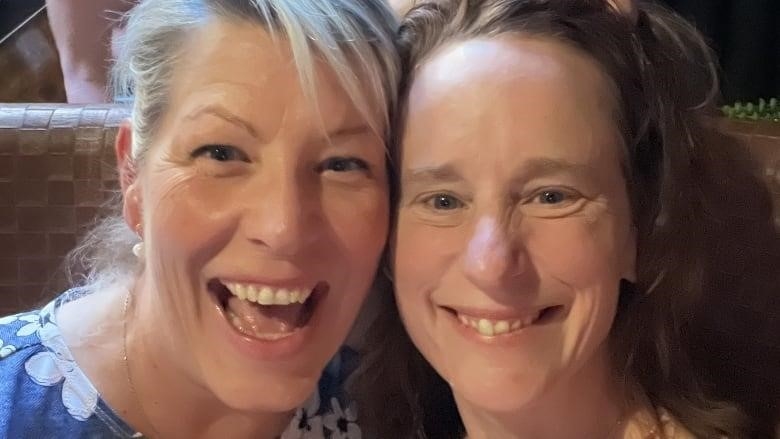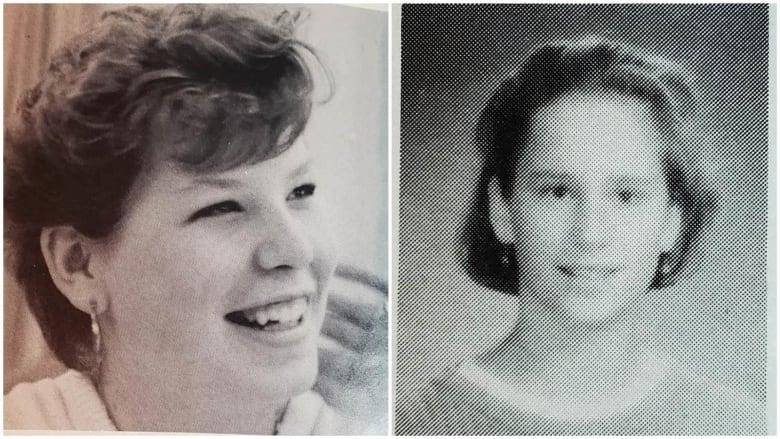
Hearing about each other’s pasts helped us both get better
This is Melanie Chambers’s First Person column. She lives in Rossland, B.C. For more information about CBC’s First Person stories, visit please see the FAQ.
Even though it happened over 30 years ago, my hands are shaking as I type a message to the person who picked on me in high school. I feel like I’m back in Dartmouth High School again, walking toward her. I used to keep my eyes on the ground until,whamShe hit me in the shoulder, making me fall and my books and pens fly. As she walked away, her cackling laughter would fade, leaving me on my knees to get my things.
But now, many years later, when I see her picture on the Facebook pages of friends, I reach out to her.
“I wanted to know why you chose to go after me. Had I in some way encouraged you? Or was it because I was with someone you wanted me to be with?”
Click. Sent. Message gone. Breathe in. But when I get up to get a drink to calm down, I see that the tiny dots on the screen are moving. She has already replied. I sit down again and wait for a message from Kendra.
“I’m so sorry that you think of yourself as one of my targets. It makes me feel so bad to know that I’ve hurt anyone so deeply and for so long. Even more so if they hadn’t done anything to deserve it. Please know that you haven’t done anything wrong. I did it all.”
Kendra gave a long, thoughtful answer in which she talked about her own trauma, sexual assault, and years of therapy. It wasn’t just one answer at all. I got so much more than I asked for.
As a child, I was often picked on by the girls my age. I was the new kid in Grade 4, so I stood out. Our family moved from Dartmouth, Nova Scotia, to the quiet rural shores of St. Margaret’s Bay, and I often wore my mother’s old blazers and dresses. One day during recess, a group of Grade 6 girls pushed me up against the brick wall, making me feel like a prisoner facing a firing squad.
They yelled, “Prissy girl, who do you think you are?”
Later, when I was in Grade 9, I went out with a friend’s ex-boyfriend. This made my group of friends not want to be friends with me for the rest of high school.
Kendra was in the grade above me, and we had never talked before she started picking on me in 10th grade. Because of her, I hated going to school that year. When she finally got the new boy I was dating (he broke up with me for her), the teasing stopped, but the damage was done: I learned that women were the competition.

Not long after we first talked on Facebook, I met Kendra on Zoom, and she told me more.
“Do you remember when we were so close in the school bathroom that we had to be pulled apart?” she asked. No. I didn’t remember at all that we had pulled each other’s hair. What else did I try to hide?
We agreed to meet in person when I went to Halifax a few months later. I was writing a memoir about what it’s like to be a woman, and I was interested in meeting her. Maybe this incident of bullying could explain why I’ve always had trouble trusting other women.After we said goodbye, I closed my laptop and cried, shocked at how happy I was. Her words let go of thirty years of stress I didn’t even know I was carrying.
When we finally met in person, we gave each other a very tight hug.
At first, looking into her eyes again after so long felt strange, scary, and strange. Women are known to be hard on each other. We gossip and say bad things about each other. But during those three hours over dinner, she often touched my arm and said my name to make me feel better as we talked about age, sexuality, the shame of being a sexually curious woman, body image, therapy, mothers, fathers, and relationships. We told her everything we had learned about what it meant to be a woman. We found that we had more in common than we did not.
Saying goodbye, we hugged again.

“You were a gift to me, Melanie,” she told me several times as we ate.
I realized that I had given her a chance to apologize and make up for what had happened. Her words also helped me feel better. I didn’t always trust women, but her message made me think twice about that. It changed the way I think about women, because we all have our own stories. We were finally on the same side this time. As friends.
Here’s where to get help if you or someone you know is being bullied:
-
Kids Help has a phone number, 1-800-668-6868, and a website with live chat counseling.
Do you have a compelling story about yourself that can help others understand or learn something? We want to know what you think. Here’s More information about how to sell to us.
